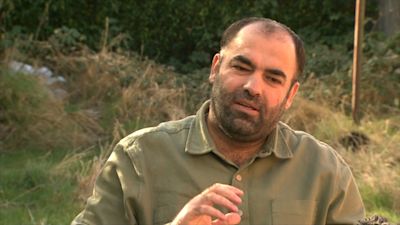The Syrian whose daughter was born as bombs fell around the delivery room

Video report by ITV News Correspondent Dan Rivers
Although Dr Munzer Khalil currently lives in the Midlands, he has recurring nightmares about his Syria, his homeland.
"I see myself in one of the places I worked before. Sometimes, I see myself in a hospital during an attack, or I see my daughters injured because of this attack," he says.Dr Khalil used to work as a surgeon in Syria - he moved to the UK after spending years treating those wounded by the ongoing conflict.
After a decade of the Syrian civil war, Syria's healthcare system has been decimated. The World Health Organisation has recorded over 500 military attacks on Syrian medical facilities since 2016.
Source: UNOCHA/WHO
Source: Physicians for Human Rights
Source: UN OCHA
Source: DEC
President Bashar al-Assad's regime and its Russian allies are responsible for the vast majority of these attacks, although rebel groups have also played a part. The assaults are particularly damaging as Syria faces both a pandemic and an untold poverty crisis.
Because of these assaults, Dr Khalil says many doctors in Syria say goodbye to their families before they leave for work, in case they are killed while on duty.
"Always, we think 'this day may be the last day in our life'," he says.
Dr Khalil describes his experiences of working during the conflict
Dr Khalil's concerns are justified - his daughter was born as bombs fell around the delivery room and he has survived over 21 attacks while working.
"We know we are the target," he adds.
"I lost a lot of my friends and colleagues in hospitals."
Fellow surgeon Dr Abdul-Hamid Dabak has opted to continue working in Syria.
He says his hospital lacks medical resources and staff.
"Unfortunately, the whole world has let us down. Syrian children, women and all the Syrian people were failed by the whole world," Dr Dabak adds.
Despite the ongoing risk, Dr Khalil is determined to return to his homeland and rejoin medics like Dr Dabak.
"In reality, we are alone. Nobody will support us. As we discovered, there are no red lines at all," he Dr Khalil says.
On the conflict's tenth anniversary, Dr Mufaddal Hamadeh, president of the Syrian American Medical Association says, the needs of Syrians are more pressing than ever, "with the emerging threat of malnutrition among children, the declining of neonatal care for pregnant women and the Covid-19 pandemic, compounded by the loss of hope and uncertainty about the future."The state of healthcare in Syria means Dr Khalil will return to a shattered profession in which those who devote their lives to helping others find themselves in the crosshairs.
The red lines that should protect hospitals still don't exist.
This report is part of an ITV News series marking a decade of Syria's civil war. Read/watch more: